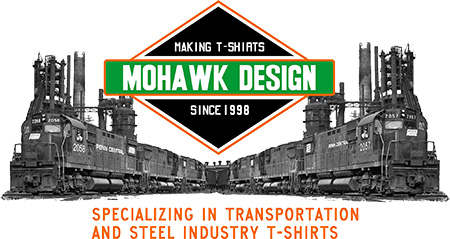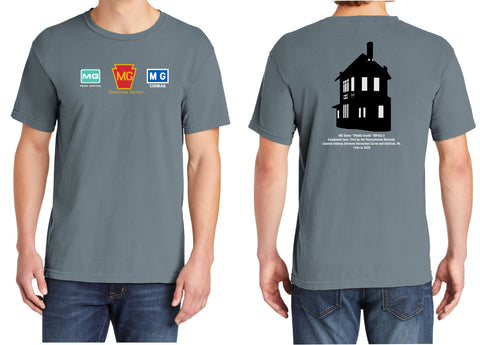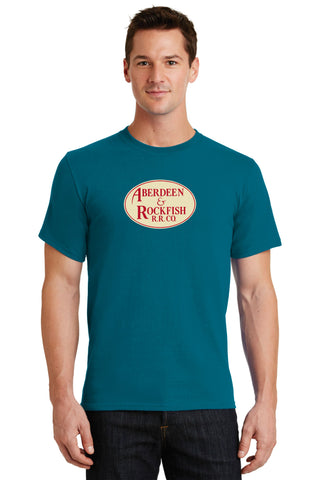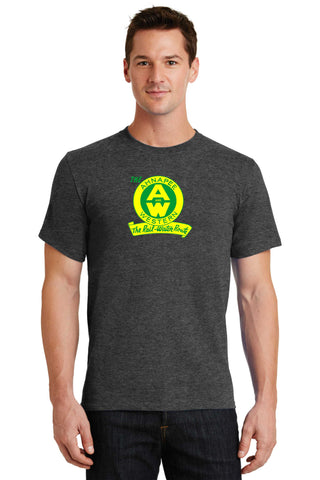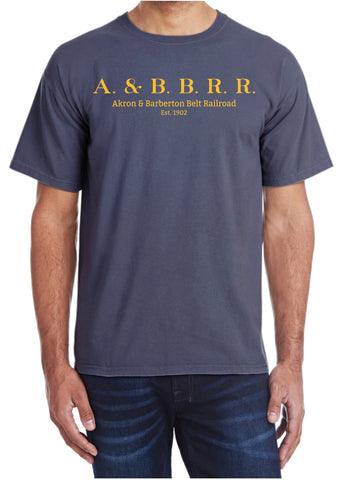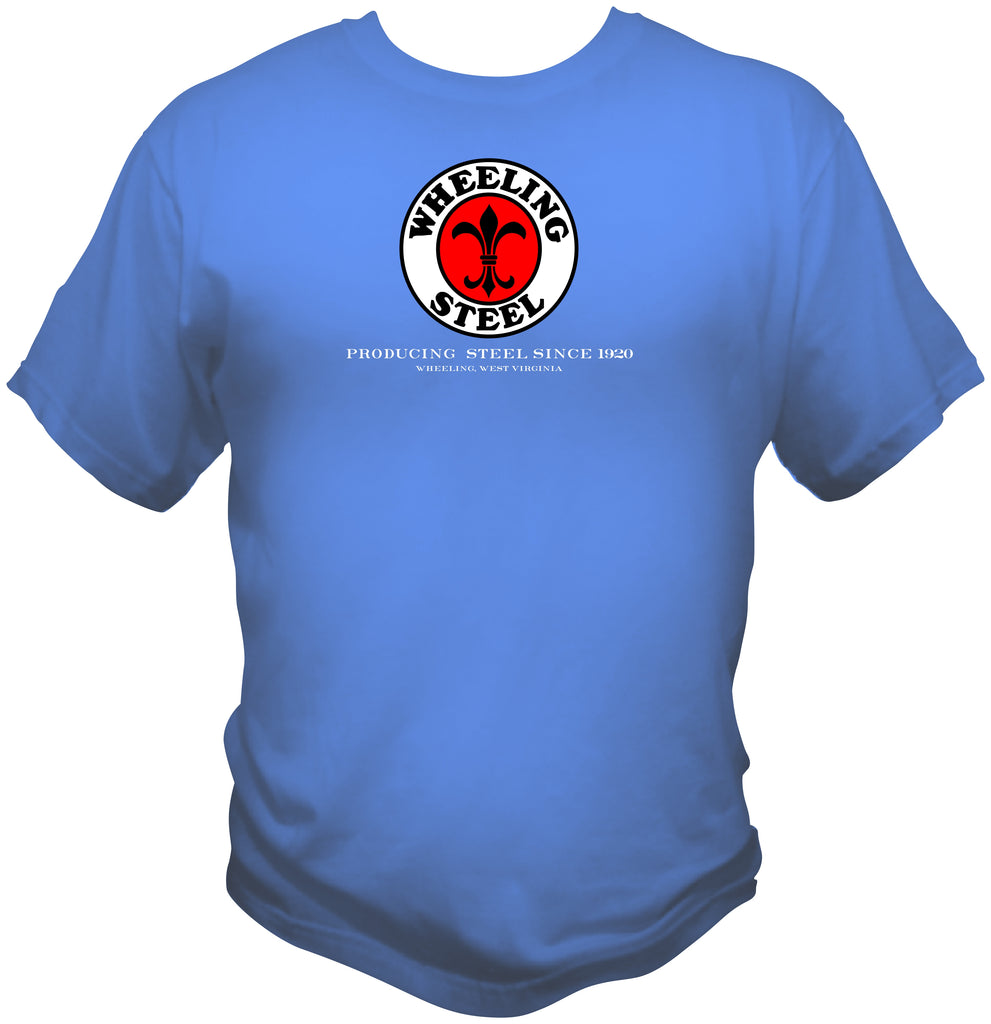
Wheeling Steel Logo Shirt
Wheeling Steel Logo Shirt
- Logo Printed on Front
- 100% Cotton
- Shirt Color - Palace Blue
*Image is a representation and may not be exact
.Wheeling Steel Corp., a completely integrated steel company, was organized June 21, 1920, as the successor to three corporations previously engaged in the steel business. The general officesare located in the 12-story Wheeling Steel Corp. building.
Today — firmly welded together with vastly improved and expanded facilities — Wheeling Steel is amajor producer of hot and cold rolled sheets, galvanized sheets and roofing, black plate and tinplate, continuous weld pipe, cut nails and many fabricated products. With its modern plantslocated along a 30-mile stretch of the Ohio River — from Steubenville to Benwood — and interconnected by rail, water and highway transportation, Wheeling Steel is in a better positiontoday than ever before to translate into action its slogan: "From mine to market."
The Steubenville works, comprising three completely integrated operations designated as North (at Steubenville), South (at Mingo Junction), and East (at Follansbee), is the major steel-producing unit of the corporation.
At Steubenville North are two blast furnaces, 11 open hearth furnaces, a blooming mill, a hotstrip mill and cold reduction mills. Principal products of the Steubenville North works include hot-rolled sheets and plates and cold rolled sheets and coils.
The Steubenville South works in Mingo Junction is connected with the North works by WheelingSteel's standard gauge railroad. Three blast furnaces and two Bessemer converters are inoperation here along with a blooming mill and auxiliary equipment. The South works supplies hot metal for the open hearths at the North works and Bessemer slabs for the Benwood works.
The Steubenville East works in Follansbee is connected with Steubenville North of WheelingSteel's railway bridge, and produces coke and coke oven gas required for manufacturingoperations. Comprising 314 coke ovens of the latest type, these facilities also include a modernplant for the recovery of by-products from coke oven gas.
At Benwood, in 1888, Francis J. Hearne produced commercially the first steel pipe made in the United States. Today Benwood is the home of Wheeling Steel pipe and one of the world's mostmodern mills devoted exclusively to the manufacture of steel pipe. Slabs from Steubenville South are processed into skelp and then formed into pipe (1/2" to 4") by the continous weld method. Wheeling also produces its own couplings and has facilities for galvanizing large tonnages of pipe.
Wheeling's No. 2 continuous weld pipe mill produces pipe of various sizes at speeds from 450 to more than 1,000 feet per minute. Wheeling Steel pipe is widely used for most types of pipe line installations, radiant heating, snow removal systems, conduit and many fabricating purposesincluding scaffolding and tubular products.
The Yorkville works of Wheeling Steel is historically noted as the birthplace of cold reduced black plate for tinning. The first tandem mill of its kind was installed there in 1928, the beginning of a process which subsequently revolutionized the entire industry. A major producer of electrolytic and hot-dipped tinplate, the Yorkville works also manufactures black plate and terneplate. There is also a modern metal decorating plant for coating and lithographing tin, terne and black plate. Two electrolytic tin plate lines produce tin plate at rates up to 1,000 feet per minute. Beginning with cold reduced and properly annealed coils, the strip is cleaned, electroplated, chemically treated, inspected, sheared and stacked in one continous operation.
Wheeling Steel's Beech Bottom works operates sheet mills for producing hot rolled electrical sheets used by electrical equipment manufacturers and has facilities for coating long ternesheets.
The Steelcrete factory, adjacent to the Beech Bottom works, manufactures expanded metal, metal lath and accessories and Steelcrete bank vault and building reinforced mesh. Here are located some of the largest machines in the world for making expanded metal, "the material of 1001 uses." One department is devoted to fabricating expanded metal products including stair treads, ironing board tops, partitions, park baskets, airplane service platforms, and railroad carice bunkers.
The Martins Ferry factory is a highly diversified manufacturing operation, producing galvanized sheets, galvanized roofing and accessories, corrugated culverts, and the world famous line of Wheeling hand-dipped ware. A separate building houses Wheeling's two continous galvanizing lines. Coils of properly prepared steel strip are continuously processed, galvanized and treated.The product of these lines, known as SofTite, has already been acclaimed by users as the ultimate in tight coated galvanized sheets. Wheeling Steel's second line, built at an estimated cost of $4 million, went into production in August. The first line, which cost $3 million, was put into operation in November, 1953. Many improvements and refinements have been incorporated in the new and larger line at Martins Ferry, which are expected to result in greater operational and production efficiency. The new line will also enable Wheeling Steel to enter new markets for galvanized material and assist in meeting the tremendous demand for SofTite.
The Wheeling factory fabricates a wide range of formed steel products including containers, stove pipe and furnace pipe, electric and gas dryers, roofing accessories, floor and roof decking, gasoline tanks for automobiles and trucks, and other automotive parts. Wheeling tri-rib steel roof deck has won wide acceptance among architects, engineers and contractors because it reduces dead load, permits use of fewer columns, shallower footings, no sub-purlins. Tri-rib has beenspecified and used for many of the country's outstanding building projects.
At the LaBelle works in Wheeling, cut nails have been manufactured continuously since 1852. Wheeling LaBelle cut nails are used widely in the building industry of hardwood flooring and building block construction.
The Ackermann factory, also located in Wheeling, was recently expanded to improve and enlarge facilities for the production of pressed and drawn steel stampings used principally by the automotive, appliance and other metal working industries. A recent development of Ackermann engineers is the "band-box," the first nestable, self-palletizing, compact-storing, reusable steel shipping container. It is a revolutionary type of all-steel container that has met with immediate and wide-spread acclaim.
